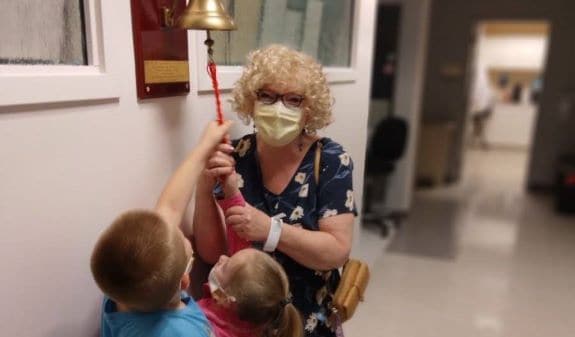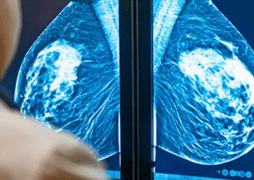The link between family history and breast cancer was well known even before actress Angelina Jolie revealed she had a gene mutation that greatly increased her risk of the disease.
Ms. Jolie’s story has certainly pushed the issue to the headlines. It’s sparked a great deal of interest in genetic testing for breast cancer, leaving many women to ask if it may be right for them – and for their families.
In addition, the study of genetics and breast cancer has evolved rapidly over the past decade. In the past, genetic testing looked at only one or two genes, but now panel or multi-gene testing is becoming more common, even though the research in this area is still ongoing.
How many breast cancers are caused by family history and genetics?
The risk from different types of inherited gene mutations can vary greatly. Some slightly increase breast cancer risk, while others (like mutations in the well-known BRCA1 and BRCA2 genes) greatly increase risk.
Although family history and genetics are important risk factors for breast cancer, they account for only 5-10 percent of all cases in the U.S. [1]. This means most breast cancers are not due to genetic factors, such as BRCA1/2 mutations.
What genes are known to increase breast cancer risk?
In addition to BRCA1/2 mutations, other gene mutations known to increase breast cancer risk include [2]:
- ATM
- CDH1
- CHEK2
- PALB2
- PTEN
- STK11
- TP53 (p53)
How common are BRCA1/2 mutations?
Thankfully, they’re not common.
About 1 out of every 400-800 people in the U.S. (or less than 1 percent) has a BRCA1/2 mutation [1].
In people of Ashkenazi Jewish decent, the rate is higher, around 1 in 40, or 2.5 percent [1].
The percentage of people in the U.S. with other high-risk gene mutations is less well understood.
How much does a BRCA1/2 mutation increase risk?
Breast cancer risk varies by BRCA1/2 mutation [1,3-4]:
- Women with a BRCA1 mutation have a 55 to 65 percent chance of developing breast cancer by age 70.
- Women with a BRCA2 mutation have about a 45 percent chance of developing breast cancer by age 70.
These compare to an 8 percent chance of developing breast cancer by age 70 for women at average risk in the U.S. [5]. (Lifetime risk of breast cancer, up to age 85, is about 12 percent [5].)
While these risks are very high, a BRCA1/2 mutation does not guarantee that women will develop breast cancer.
Flipping the numbers, 35-45 percent of women with a BRCA1 mutation, and about 55 percent of those with a BRCA2 mutation, will not get breast cancer by age 70.
Women with BRCA1/2 mutations are also at risk for ovarian cancer [1].
Who should consider genetic testing?
Genetic testing is only recommended for people whose personal or family history of breast cancer shows they might have a genetic mutation that increases the risk of breast cancer.
For example, testing is recommended if [2]:
- There is a known BRCA1/2 mutation in your family
- You had breast cancer at age 50 or younger
- A woman in your family had breast cancer at age 50 or younger
- A woman in your family had breast cancer in both breasts
- A woman in your family had ovarian cancer
- A man in your family had breast cancer
- Your family is of Ashkenazi Jewish descent and you or someone in your family had breast cancer
Websites such as the Centers for Disease Control and Prevention’s Know:BRCA can help you work through your family history to see if testing may make sense. However, such tools should only be a starting place.
There are many things to consider before genetic testing. So, it’s important to talk in detail with a trained physician or genetic counselor to see if testing is right for you.
What are the different types of genetic testing?
The study of genetics and breast cancer has evolved rapidly over the past decade.
Traditionally, genetic testing looked at only one or two genes, focusing most often on BRCA1/2.
Increasingly common today is testing for BRCA1/2 along with multiple other high-risk gene mutations (called panel or multi-gene testing).
The evidence on panel testing is still developing. However, some studies have shown it can accurately find BRCA1/2 and other important high-risk mutations that can help manage a person’s breast cancer risk [2,6-7].
Because panel testing is still relatively new, the specific set of mutations assessed can vary from test to test. This can have an impact on how results are interpreted and how the information is used [2].
As with traditional genetic testing, panel testing should only be done in a medical setting after a detailed discussion of risks and benefits with a trained physician or genetic counselor [2,8].
What about at-home genetic testing?
Despite great marketing, at-home testing for gene mutations related to breast cancer isn’t recommended.
The U.S. Food and Drug Administration, U.S. Federal Trade Commission and Centers for Disease Control and Prevention all caution against the use of at-home testing kits.
Only testing in an in-person medical setting provides the accuracy and expert counseling that are essential to genetic testing.
What happens during genetic testing?
The test itself is very simple. A small blood or saliva sample is taken and sent to a lab to be analyzed.
Results can take several weeks to come back and are typically sent to your physician or genetic counselor.
- If results show you have a mutation, other family members may be recommended for testing.
- If you don’t have a mutation, other family members probably won’t be recommended for testing.
Health insurance usually covers the cost of genetic testing for people considered at risk for having a breast cancer gene mutation (when it is recommended by a health care provider). However, if you have questions about coverage, talk with your insurance provider.
What if I have a gene mutation that increases risk?
It can be a shock to learn you have a gene mutation that increases your risk of breast cancer.
However, if you have a mutation, there are steps you can take to lower or manage your risk.
BRCA1/2 gene mutations
Women with a BRCA1/2 mutation typically have three options:
- Get more intensive breast cancer screening
- Take risk-reducing medications, like tamoxifen or raloxifene
- Have preventive surgery to remove both breasts and/or the ovaries
Each choice has benefits and drawbacks, which should be discussed in detail with a trained physician.
Other gene mutations
Guidelines for managing risk in women with other high-risk gene mutations are less clear, but developing.
Additional screening is most commonly recommended, with preventive surgery an option in certain cases [2].
Summary
Most breast cancers are not due to family history or genetic factors, such as BRCA1/2 mutations.
Genetic testing is only recommended for certain people at high risk based on their personal or family history of the disease. Testing should only be done in a medical setting with a trained physician or genetic counselor.
BRCA1/2 are the most well-known gene mutations and greatly increase breast cancer risk. Women with these mutations can often take steps to manage or lower their risk.
Expanded panel testing for BRCA1/2 and other high-risk mutations is becoming more common and can provide useful information about breast cancer risk.
Komen Scholar, William Foulkes, MB.BS., Ph.D., James McGill Professor of Human Genetics and Oncology and Director of the Program in Cancer Genetics at McGill University and Head of the Cancer Genetics Laboratory at Lady Davis Institute for Medical Research at the Jewish General Hospital shared his thoughts on genetic testing.
“Much has changed since Komen last covered genetic testing in a Komen Perspectives article in 2012 (What is Genetic Testing For Breast Cancer and Who Should Get It?). This new Komen Perspectives article emphasizes that testing for genes other than just BRCA1 and BRCA2 (so-called panel testing) is now available to many women at risk.
Moreover, the Supreme Court of the United States determined that DNA in its native state was not patentable. Many companies are now offering genetic testing and the costs have fallen dramatically.
Genetic testing can provide important information about breast cancer risk, especially for women with a strong family history of the disease. Komen continues to encourage women to obtain independent, professional advice before undergoing genetic testing.”
What is Komen doing?
Since 1982, Komen has invested more than $28 million in research focused on hereditary breast cancer.
As a result of this research we have learned that:
- Inherited mutations in the PALB2 gene increase the risk of breast cancer.
- Inherited mutations in the RECQL gene may increase the risk of breast cancer.
- Including a family history of other cancers, such as prostate and pancreatic, may help improve breast cancer risk assessment tools like BRCAPRO.
Ongoing research includes:
- Creating a registry to track and assess the risk of developing breast cancer among people with inherited gene mutations that increase risk.
- Using cutting edge genomic technology to identify new genes linked to inherited breast cancer
- Identifying the cellular factors that affect why some women with a BRCA1/2 mutation develop breast cancer and others do not
Komen has also invested more than $5 million in research specifically focused on the psychosocial and other aspects of genetic counseling and testing for hereditary breast cancer.
Komen resources
Questions to Ask Your Doctor: Inherited Gene Mutations and Breast Cancer Risk
Genetic Counseling and Testing for BRCA1 and BRCA2 Mutations
Options for Women at Higher Risk
Facts for Life: Genetics and Breast Cancer
Research Fast Facts: BRCA Genes and Breast Cancer
| KOMEN SUPPORT RESOURCES |
| – Calls to our breast care helpline 1-877 GO KOMEN (1-877-465-6636) are answered by a trained and caring staff member Monday – Thursday 9 a.m. EST – 7 p.m. EST and Friday 9:00 a.m. – 6:00 p.m. EST. Our helpline provides free, professional support services to anyone with breast cancer questions or concerns, including breast cancer survivors and their families. You can also email the breast care helpline at helpline@komen.org. – Our Message Boards offer online forums for breast cancer survivors to share their experiences and advice with other breast cancer survivors. Our Women at Higher Risk of Breast Cancer forum within the Message Boards offers women at higher risk a place to share their own unique experiences and challenges. – We also offer a forum for men. Our Men Can Get Breast Cancer Too forum offers men a place to share their experiences with other male breast cancer survivors. – Our fact sheets, booklets and other education materials offer additional information for survivors. |
References
- National Cancer Institute. Genetics of breast and gynecologic cancers-health professional version (PDQ). http://www.cancer.gov/types/breast/hp/breast-ovarian-genetics-pdq#section/_88, 2016.
- National Comprehensive Cancer Network (NCCN). NCCN clinical practice guidelines in oncology: Genetic/familial high-risk assessment—breast and ovarian, Version 2.2015. http://www.nccn.org, 2015.
- Chen S, Parmigiani G. Meta-analysis of BRCA1 and BRCA2 penetrance. J Clin Oncol. 25(11):1329-33, 2007.
- Antoniou AC, Cunningham AP, Peto J, et al. The BOADICEA model of genetic susceptibility to breast and ovarian cancers: updates and extensions. Br J Cancer. 98(8):1457-66, 2008.
- American Cancer Society. Breast Cancer Facts & Figures, 2015-2016, 2015.
- Desmond A, Kurian AW, Gabree M, et al. Clinical actionability of multigene panel testing for hereditary breast and ovarian cancer risk assessment. JAMA Oncol. 1(7):943-51, 2015.
- Lincoln SE, Kobayashi Y, Anderson MJ, et al. A systematic comparison of traditional and multigene panel testing for hereditary breast and ovarian cancer genes in more than 1000 patients. J Mol Diagn. 17(5):533-44, 2015.
- Easton DF, Pharoah PD, Antoniou AC, et al. Gene-panel sequencing and the prediction of breast-cancer risk. N Engl J Med. 372(23):2243-57, 2015.



